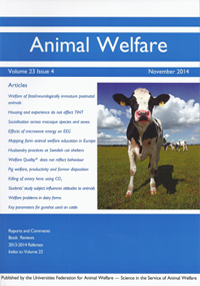Document type: scientific article published in Animal Welfare
Author: DW Bruckner
Preview: There are competing conceptions of animal welfare in the scientific literature. Debate among proponents of these various conceptions continues. This paper examines methodologies for use in attempting to justify a conception of animal welfare. It is argued that philosophical methodology relying on conceptual analysis has a central role to play in this debate. To begin, the traditional division between facts and values is refined by distinguishing different types of values, or norms. Once this distinction is made, it is argued that the common recognition that any conception of animal welfare is inherently normative is correct, but that it is not ethical normativity that is at issue. The fate of philosophical methodology appropriate to use in investigating the competing normative conceptions of animal welfare is explained. Finally, the threads of the paper are brought together to consider the appropriate role of recent empirical work into folk conceptions of animal welfare in determining the proper conception of animal welfare. It is argued that empirical results about folk conceptions are useful inputs into conceptual philosophical investigation into the competing conceptions of animal welfare. Further mutual inquiry by philosophers and animal welfare scientists is needed to advance our knowledge of what animal welfare is.



